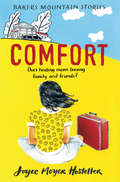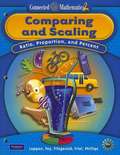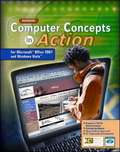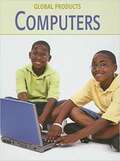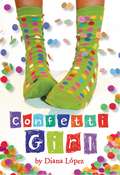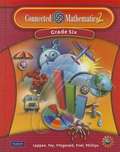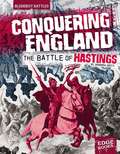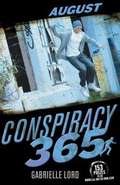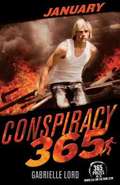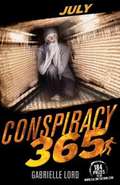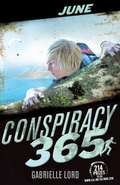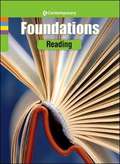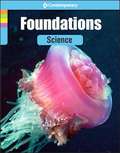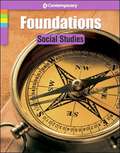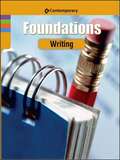- Table View
- List View
Come, Sit, Stay
by Arden MooreLearn the building blocks of basic obedience with helpful training tips on how to master the three most important dog commands- come, sit, and stay. Now in its revamped resign, this simple solutions guide will serve as an easy-to-use foundation for successful dog training.
Comfort (Bakers Mountain Stories Ser.)
by Joyce Moyer HostetterNow that Daddy has returned from fighting Hitler and Ann Fay is home from the polio hospital, life should get back to normal. But Ann Fay discovers she no longer fits easily into old friendships and Daddy has been traumatized by the war. Her family and social life are both falling apart. Ever responsible, she tries to fix things until she finally admits that she herself needs fixing. She travels to the Georgia Warm Springs Foundation, founded by Franklin D. Roosevelt, where she finds comfort, healing, and even a little romance. Although this invigorating experience does not solve all her problems, it does give Ann Fay a new view of herself. In this Parents' Choice Awards Recommended Book, sequel to Blue, Ann Fay makes new friends, reevaluates old relationships and discovers her unique place in the community.
Comparing and Scaling, Ratio, Proportion, and Percent
by Glenda Lappan James T. Fey William M. Fitzgerald Susan N. Friel Elizabeth Difanis PhillipsNIMAC-sourced textbook
Computer Concepts in Action
by Stephen E. HaagGlencoe'sComputer Concepts in Actionrevised edition is designed for Microsoft Office 2007 and Windows Vista. It is written specifically to meet the needs of secondary students and teachers, and meets IC3 Standards. This highly visual text teaches essential computer concepts and skills through hands-on activities and projects. Concepts such as ethics, careers, hardware and software applications, the Internet, and e-commerce, are taught using high-interest topics and real-world scenarios that are designed to engage students.
Computer Concepts in Action
by Stephen E. HaagGlencoe'sComputer Concepts in Actionrevised edition is designed for Microsoft Office 2007 and Windows Vista. It is written specifically to meet the needs of secondary students and teachers, and meets IC3 Standards. This highly visual text teaches essential computer concepts and skills through hands-on activities and projects. Concepts such as ethics, careers, hardware and software applications, the Internet, and e-commerce, are taught using high-interest topics and real-world scenarios that are designed to engage students.
Computers (21st Century Skills Library: Global Products)
by Kevin CunninghamFind out how and where computers are manufactured and the journey they take before they end up in homes, schools and offices.
Concepts and Challenges in Physical Science
by Leonard BernsteinPhysical science is the study of both physics and chemistry. You will learn about new concepts while studying the book. What do you think are some other things that you will study in physical science?
Confetti Girl (Little Brown Novels)
by Diana LopezApolonia "Lina" Flores is a sock enthusiast, a volleyball player, a science lover, and a girl who's just looking for answers. Even though her house is crammed full of books (her dad's a bibliophile), she's having trouble figuring out some very big questions, like why her dad seems to care about books more than her, why her best friend's divorced mom is obsessed with making cascarones (hollowed eggshells filled with colorful confetti), and, most of all, why her mom died last year. Like colors in cascarones, Lina's life is a rainbow of people, interests, and unexpected changes.In her first novel for young readers, Diana López creates a clever and honest story about a young Latina girl navigating growing pains in her South Texan city.
Connected Mathematics 2, Grade Six
by Glenda Lappan James T. Fey William M. FitzgeraldNIMAC-sourced textbook
Connected Mathematics 2: Datos sobre nosotros Estadísticas
by Glenda Lappan James T. Fey William M. Fitzgerald Susan N. Friel Elizabeth Difanis PhillipsNIMAC-sourced textbook
Connected Mathematics 2: ¿Qué probabilidad hay? Comprender la probabilidad
by Glenda Lappan James T. Fey William M. Fitzgerald Susan N. Friel Elizabeth Difanis PhillipsNIMAC-sourced textbook
Conquering England: The Battle of Hastings (Bloodiest Battles Ser.)
by Barbara DavisDiscover the stories behind some of history’s deadliest battles. Each book presents the basics of each event, including the forces engaged on each side, the weapons they used, and the aftermath of these epic clashes. Lexile Measure: 800L
Conspiracy 365: August
by Gabrielle LordOn New Year's Eve, Callum Ormond is chased down the street by a crazed man with a deadly warning: They killed your father. They'll kill you. You must survive the next 365 days. Cal is fighting for his sister's life. But nobody believes the 'psycho kid' and he's running out of people he can trust. He doesn't even know which of his enemies he's facing. How many hard-won treasures will he have to relinquish in return for his sister's safety?
Conspiracy 365: January
by Gabrielle LordOn New Year's Eve, Cal is chased down the street by a crazed man with a deadly warning: They killed your father. They'll kill you. You must survive the next 365 days! Forced into a life on the run, Cal finds himself hunted by ruthless criminals and the police. Somehow he must uncover the truth about his father's mysterious death and solve the Ormond Singularity, a secret from the past, before the year is up. But who can he turn to when the whole world seems to want him dead? The clock is ticking. Any second could be his last. Callum Ormond has been warned. He has 365 days. The countdown has begun ...
Conspiracy 365: July
by Gabrielle LordOn New Year's Eve, Callum Ormond is chased down the street by a crazed man with a deadly warning: They killed your father. They'll kill you. You must survive the next 365 days. Cal is running out of places to hide. Everywhere he goes, someone seems to be behind him, tracking his every move. They don't care who they hurt to get to him. As his sixteenth birthday approaches, the threat to him and his family increases. Nobody is safe while the secret of the Ormond Singularity remains unsolved. And Cal's enemies will do anything to make sure he doesn't see his sixteenth ... He has 184 days. He can't hide for ever ...
Conspiracy 365: June
by Gabrielle LordOn New Year's Eve, Callum Ormond is chased down the street by a crazed man with a deadly warning: They killed your father. They'll kill you. You must survive the next 365 days. Somebody wants Cal out of the way - for good. He's been living on the run for six months, hunted by criminals and the police as he tries to solve a sinister family secret from the past. He's been mauled by a lion, attacked by sharks and used as target practice on a firing range, but things are about to turn more dangerous yet. He has 205 days. Over half the year to go ...
Contemporary Foundations: Reading
by McGraw-HillContemporary's Foundations series helps students improve their basic skills. Each book provides skill instruction, offers interesting passages to study, and furnishes opportunities for practice. Foundations provides meaningful contexts for learning, using language which is easy to understand. About Foundations: Reading, Revised Edition: Foundations: Reading will help students improve their reading ability, as well as their writing and thinking skills. Foundations: Reading is divided into four units: Practical Reading: ''survival'' reading that you do everyday. Practical reading includes instructions, advertisements, and explanations. Reading Nonfiction: writing based on facts. Nonfiction includes newspaper and magazine articles, books about real people and real events, and encyclopedia articles. Reading Poetry: verse that captures a person's feelings. Learning to recognize form, rhythm, rhyme, and images will help you read and appreciate poetry. Reading Short Fiction: stories created from an author's imagination. Characters, setting, plot, and theme are important elements in every story. These special features in Foundations: Reading will help students practice language skills: Writing Workshops: detailed instructions that will guide the student through the four-step writing process: prewriting, drafting, revising, and editing Language Tips: explanations, pronunciations, study hints, and background information that will help the student understand what he or she is reading Test Skills: a reminder that this skill is often tested on standardized tests Posttest: a test, evaluation chart, and answer key, to gauge the mastery of each skill. Revised Edition Features: New language tips, Updated content, including revised passages, updated graphs and images, More exercises. About the Series: In Foundations: Reading, students will read practical information, nonfiction, poetry, and short stories. They will learn to find the main point and the details; identify fact, opinion, and bias; make inferences; read photographs and cartoons; and understand rhythm, rhyme, plot, and theme. Writing Workshops, Language Tips, and prereading questions are designed to improve reading, writing, and thinking skills. In Foundations: Writing, students will practice the four steps to writing an essay: prewriting, drafting, revising, and editing. They will read and write five kinds of essays: descriptive essays, personal narratives, how-to essays, essays of example, and comparison-and-contrast essays. A language-skills workbook provides grammar, punctuation, and sentence structure practice. In Your Journal, With a Partner, and Language Tips will help students become better writers, and better readers and thinkers as well. In Foundations: Science, students will learn about the human body, plant biology, physics, chemistry, and Earth science. They will practice putting events in order; reading diagrams, charts, and graphs; using the scientific method; and making comparisons and contrasts. Try It yourself! activities will guide students through simple experiments so they will have a better understanding of what they have been reading about. Writing Workshops and Language Tips will help students use their reading and writing skills to think about science topics. In Foundations: Social Studies, students will learn about world history, U.S. history, civics and government, geography, and economics. They will summarize, make predictions, infer the main idea of cartoons, find information on maps, and read various kinds of graphs. Background Information, Language Tips, and Writing Workshops will let students use what they already know as they read and write about social studies topics. The revised edition includes a new World History chapter. In Foundations: Math, students will practice using whole numbers, money, decimals, fractions, ratios, and percents. Exercises will help students review the addition, subtraction, multiplication, and division facts; round numbers; estimate answers; and solve word problems. Math Notes, On their Calculator, and Language ...
Contemporary Foundations: Science
by Wright Group/McGraw-HillContemporary's Foundations series helps students improve their basic skills. Each book provides skill instruction, offers interesting passages to study, and furnishes opportunities for practice.Foundations provides meaningful contexts for learning, using language which is easy to understand. About Foundations: Science, Revised Edition : In Foundations: Science, students will learn about the human body, plant biology, physics, chemistry, and Earth science. They will practice putting events in order; reading diagrams, charts, and graphs; using the scientific method; and making comparisons and contrasts. Try It yourself! activities will guide students through simple experiments so they will have a better understanding of what they have been reading about.Writing Workshops and Language Tips will help students use their reading and writing skills to think about science topics. About the Series: In Foundations: Reading, students will read practical information, nonfiction, poetry, and short stories. They will learn to find the main point and the details; identify fact, opinion, and bias; make inferences; read photographs and cartoons; and understand rhythm, rhyme, plot, and theme. Writing Workshops, Language Tips, and prereading questions are designed to improve reading, writing, and thinking skills. In Foundations: Writing, students will practice the four steps to writing an essay: prewriting, drafting, revising, and editing. They will read and write five kinds of essays: descriptive essays, personal narratives, how-to essays, essays of example, and comparison-and-contrast essays. A language-skills workbook provides grammar, punctuation, and sentence structure practice. In Your Journal, With a Partner, and Language Tips will help students become better writers, and better readers and thinkers as well. In Foundations: Science, students will learn about the human body, plant biology, physics, chemistry, and Earth science. They will practice putting events in order; reading diagrams, charts, and graphs; using the scientific method; and making comparisons and contrasts. Try It yourself! activities will guide students through simple experiments so they will have a better understanding of what they have been reading about. Writing Workshops and Language Tips will help students use their reading and writing skills to think about science topics. In Foundations: Social Studies, students will learn about world history, U.S. history, civics and government, geography, and economics. They will summarize, make predictions, infer the main idea of cartoons, find information on maps, and read various kinds of graphs. Background Information, Language Tips, and Writing Workshops will let students use what they already know as they read and write about social studies topics. The revised edition includes a new World History chapter. In Foundations: Math, students will practice using whole numbers, money, decimals, fractions, ratios, and percents. Exercises will help students review the addition, subtraction, multiplication, and division facts; round numbers; estimate answers; and solve word problems. Math Notes, On their Calculator, and Language Tips will help students improve math skills. The revised edition of Math is a major revision. The language has been updated to make the material even easier to follow than before.
Contemporary Foundations: Social Studies
by Wright Group/McGraw-HillContemporary'sFoundationsseries helps students improve their basic skills. Each book provides skill instruction, offers interesting passages to study, and furnishes opportunities for practice.Foundationsprovides meaningful contexts for learning, using language which is easy to understand. AboutFoundations: Social Studies, Revised Edition : In Foundations: Social Studies, students will learn about world history, U.S. history, civics and government, geography, and economics. They will summarize, make predictions, infer the main idea of cartoons, find information on maps, and read various kinds of graphs. Background Information,Language Tips, andWriting Workshops will let students use what they already know as they read and write about social studies topics. The revised edition includes a new World History chapter. About the Series: In Foundations: Reading, students will read practical information, nonfiction, poetry, and short stories. They will learn to find the main point and the details; identify fact, opinion, and bias; make inferences; read photographs and cartoons; and understand rhythm, rhyme, plot, and theme. Writing Workshops, Language Tips, and prereading questions are designed to improve reading, writing, and thinking skills. In Foundations: Writing, students will practice the four steps to writing an essay: prewriting, drafting, revising, and editing. They will read and write five kinds of essays: descriptive essays, personal narratives, how-to essays, essays of example, and comparison-and-contrast essays. A language-skills workbook provides grammar, punctuation, and sentence structure practice. In Your Journal, With a Partner, and Language Tipswill help students become better writers, and better readers and thinkers as well. In Foundations: Science, students will learn about the human body, plant biology, physics, chemistry, and Earth science. They will practice putting events in order; reading diagrams, charts, and graphs; using the scientific method; and making comparisons and contrasts. Try It yourself!activities will guide students through simple experiments so they will have a better understanding of what they have been reading about. Writing Workshops and Language Tips will help students use their reading and writing skills to think about science topics. In Foundations: Social Studies, students will learn about world history, U.S. history, civics and government, geography, and economics. They will summarize, make predictions, infer the main idea of cartoons, find information on maps, and read various kinds of graphs. Background Information, Language Tips, and Writing Workshops will let students use what they already know as they read and write about social studies topics. The revised edition includes a new World History chapter. In Foundations: Math, students will practice using whole numbers, money, decimals, fractions, ratios, and percents. Exercises will help students review the addition, subtraction, multiplication, and division facts; round numbers; estimate answers; and solve word problems. Math Notes, On their Calculator, and Language Tips will help students improve math skills. The revised edition of Math is a major revision. The language has been updated to make the material even easier to follow than before. Foundations series at a glance
Contemporary Foundations: Writing
by McGraw Hill Wright GroupContemporary'sFoundationsseries helps students improve their basic skills. Each book provides skill instruction, offers interesting passages to study, and furnishes opportunities for practice.Foundationsprovides meaningful contexts for learning, using language which is easy to understand. Foundations: Writingwill help students improve their writing skills, as well as their reading and thinking skills. Part I: Writing helps students practice the four stages of the writing process: Prewriting: planning and organizing Drafting: writing by following a plan Revising: evaluating and rewriting Editing: correcting grammar, mechanics, and usage Students will learn about five types of essays and practice writing each type: Descriptive Essay Personal Narrative How-To Essay Essay of Example Comparison-and-Contrast Essay Part II: Grammar focuses on language skills that writers need to understand. Grammar: nouns, pronouns, verbs, adjectives, and adverbs Punctuation: periods, question marks, exclamation marks, commas, and semicolons Sentence Structure: incomplete sentences, run-on sentences, and comma splices The following special features will help students practice their writing skills. In Your Journal: ideas to think about and write about on your own Language Tip: explanations, pronunciations, study hints, and background information that will help students understand what they read Test Skills: a reminder that this skill is often tested on standardized tests With a Partner: reading, writing, and thinking activities to do with a classmate, family member, or friend Posttest: a test, evaluation chart, and answer key to guage skill mastery Revised Edition Features: New language tips Updated content, including revised passages, updated graphs and images More exercises About the Series: In Foundations: Reading, students will read practical information, nonfiction, poetry, and short stories. They will learn to find the main point and the details; identify fact, opinion, and bias; make inferences; read photographs and cartoons; and understand rhythm, rhyme, plot, and theme. Writing Workshops, Language Tips, and prereading questions are designed to improve reading, writing, and thinking skills. In Foundations: Writing, students will practice the four steps to writing an essay: prewriting, drafting, revising, and editing. They will read and write five kinds of essays: descriptive essays, personal narratives, how-to essays, essays of example, and comparison-and-contrast essays. A language-skills workbook provides grammar, punctuation, and sentence structure practice. In Your Journal, With a Partner, and Language Tipswill help students become better writers, and better readers and thinkers as well. In Foundations: Science, students will learn about the human body, plant biology, physics, chemistry, and Earth science. They will practice putting events in order; reading diagrams, charts, and graphs; using the scientific method; and making comparisons and contrasts. Try It yourself!activities will guide students through simple experiments so they will have a better understanding of what they have been reading about. Writing Workshops and Language Tips will help students use their reading and writing skills to think about science topics. In Foundations: Social Studies, students will learn about world history, U.S. history, civics and government, geography, and economics. They will summarize, make predictions, infer the main idea of cartoons, find information on maps, and read various kinds of graphs. Background Information, Language Tips, and Writing Workshops will let students use what they already know as they read and write about social studies topics. The revised edition includes a new World History chapter. In Foundations: Math, students will practice using whole numbers, money, decimals, fractions, ratios, and percents. Exercises will help students review the addition, subtraction, multiplication, and division facts; round numbers; estimate answers; and solve word problems. Math Notes, On their Calculator, and Language Ti...
Content Essentials For Science, Student Handbook, Level C
by Margarita CalderonYour book has two parts, you can use the first part to learn about science topics. If you need help reading or writing about science, use the second part.

